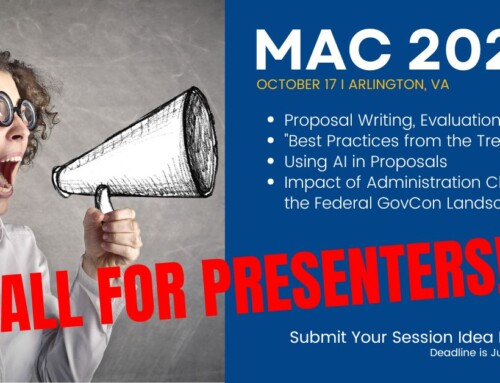by Rebecca Link, APMP-NCA Chapter President
This has been a busy quarter for our local APMP chapter and even busier for APMP International as they prepared for their annual Bid and Proposal Conference held in San Diego. Out of the many themes that the conference offered to its attendees, one stood out to me as significantly important and valuable. Leadership and Professional Development are two of the most important areas that we as proposal professionals need to focus on. For those of us on the front lines and leading teams of people, we must constantly evolve and change our leadership styles to meet the needs of our internal customers.
Each team is different. What motivates one person may restrict another. When you push a team too hard, sometimes they push back. So, how do you get people to WANT to work for you? Here are a few skills and tactics that I employ to foster teamwork and keep the train on the tracks.
- Have open communication. Something that is very important to me is how comfortable my team feels working with me. This can take time to establish, but one thing that I do to begin to build that rapport is to make sure that I am responsive—answering emails promptly, helping writers to find content, checking in on the team, having regular status calls, and offering assistance all the time. I have my emails come to my phone so I never miss a communication. I also encourage people to call me, at my desk or on my cell, if they need to get in touch with me. This sometimes means texting with a teammate at 8:00 p.m. or a Saturday afternoon! If I want my team to work for me, I have to be willing to work for them.
- Praise people often. VPs, experts, co-workers, sometimes all it takes is a simple, “Hey, you are really doing a great job with this!” to brighten someone’s day and get them out of a funk they may have been creeping I go the extra yard to say specifically what they have done well. Instead of, “You are doing great,” I say something like, “I really liked how you weaved in the customer quote to give credence to your claim.” This shows that I spent the time reading their work, which goes a long way. Proposals are stressful work, and many of the people who work on them have day jobs, too!! Let them know that you see the hard work they are putting in and that you’ve got their back, and they will continue to crank out the good stuff and meet your deadlines, too!
- Be overly organized. Make sure that you have spelled everything out for the team and that there are no surprises (that are in your control!). The government may issue amendments or change due dates, or subcontractors may cause headaches. Those are things you can’t control, but they can rattle your team. By making sure that all your ducks are in a row as a proposal manager/coordinator, you are able to at least give the team a sense of stability with your process. Ensure that your kickoff slides are robust. If someone needs to get a POC, they can find it in the slides. Forget which day Red Team is on? Check the slides. Want to see an outline of the tech volume? SLIDES. Having one place the whole team can go to reference information about expectations and process is invaluable (and can limit the amount of emails that they send you with questions!). There are many tools out there that companies use to create that one space where writers can find everything, whether it’s Privia, SharePoint, or VPC as examples. Also make sure to have plenty of artifacts to support you and the team. If it is a hard copy submission, create a production checklist so you know what needs to be done. If there are a bunch of resumes, consider a personnel matrix so you can ensure that the people you are bidding meet the qualifications.
The other topic of importance to me is Professional Development. For many of us, we have completed the programs and degrees that we had strived for and are no longer “students”. Perhaps some of us are still working toward that degree. The fact of the matter is, there comes a time when those chapters are behind us and we are established in our careers.
So, what then? I am a firm believer in continuing growth and education. My father, who was 81 at the time, said to me one day “You know what, Bec? There is not a day that goes by that I don’t learn something new.” This has stuck with me and continues to be a goal that I strive for in my daily life.
When applied to our careers, we begin to look at the opportunities that are available and that can enable us to reach new heights, get promotions, grow our networks, and broaden our skill sets. We are fortunate to be in the second largest APMP chapter in the world. Because of this, the opportunities that are given to our members are much greater than that in other areas. In our chapter, members can take advantage of a totally free pro- gram we offer called the Mentor-Protégé Program. Every year we allow members to submit their applications to be either a mentor or a protégé. Pairs are carefully selected based on geography, experience, and interests. This mutually beneficial offering allows the paired individuals to design a plan to meet goals throughout the year and get support from the chapter in accomplishing them. Quarterly dinners are held to discuss progress, and mentors are given stipends to assist with any materials or meetings needed. It truly is a win-win for everyone who participates. Additionally, our chapter offers a number of free webinars throughout the year on a variety of topics to support our members’ development.
Another great opportunity that is specific to our profession is the ability to obtain certifications in our field.
Once we are finished with schooling, many people choose to become certified in their fields of expertise. In APMP, there are three levels of certification that professionals can complete. The Foundation Level certification covers basic principles and is administered in a 75-question multiple choice test. This test can also be administered at the end of a training class if you are not a fan of self-studying! The Practitioner Level certification is a bit more involved and requires the individual to write short answer essays describing the process for which they complete their work as a proposal professional. The third and final level, the Professional Level, consists of a face-to-face interview by a panel providing verbal, real-time responses to questions that are asked of you about your career. Other certification options for those in our industry can be the Project Management Professional certification offered by the Project Management Institute, which can help you to learn how to manage time on projects and how to meet all your project goals. Potentially beneficial, ITIL Certification can offer benefits such as understanding of lifecycle stages and service management practices.
Finally, regarding Professional Development, I recommend networking. This can be as simple as growing your LinkedIn profile to All Star status or can mean joining groups and clubs where you can get involved or meet new people. Giving back to the professional industry can help others learn your name, see your work in action, and open the door for feedback and communication. Learning from those around you and collaborating in different environments fosters the ability for an individual to become a multifunctional, cross-trained professional, which is not only personally rewarding because it can open new doors, but also makes you a valuable asset to any company you work for.
Regardless of whether you are a young professional or a “seasoned veteran”, maintaining a presence in the industry, committing to growth and development, and becoming a strong, positive leader will pave the way to accomplishments for years to come and might give someone else the motivation to join you along the way.
Yours in success,
Rebecca Link
[intense_card]Rebecca Link, CF APMP, Sr. Proposal Manager, American Systems. Prior to joining the industry, Rebecca completed her Master’s degree in Public Administrations. She has served on the Board of Directors for the NCA Chapter for two years. In 2017, she received the award for “Up and Coming Board Member” and was named one of APMP International’s top 40 Under 40. A member of APMP for six years, Rebecca has her Foundation Level Certification.
[/intense_card]




Leave A Comment